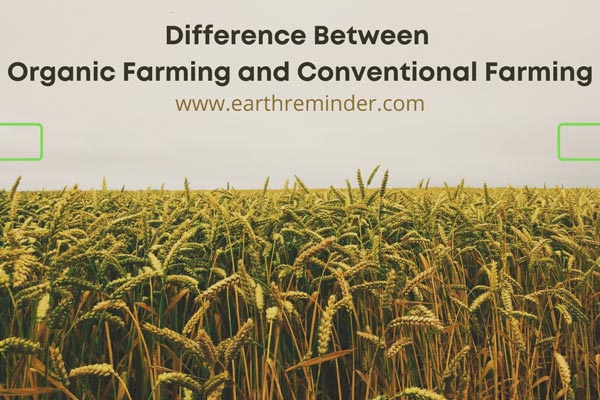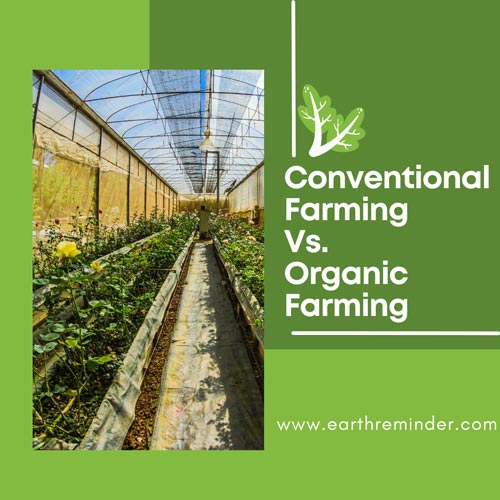Difference Between Organic Farming and Conventional Farming
Two common methods of producing food worldwide are conventional farming and organic farming. While conventional farming is still the most widely practiced method, organic farming is gaining more traction these days. People are favoring organic foods more. However, to understand this increasing trend of organic consumption, you first need to know the difference between conventional farming and organic farming.
People nowadays are not only interested in the variety of food on their table, but also its origin. How is it grown, and what impact does it have on health, the environment, and the planet?
Within this framework, we will discuss two of the most widely used techniques of food production. If you are still in the blue about the differentiating factors between conventional and organic farming, we will help you catch up.
Table of Contents
Conventional Farming Vs. Organic Farming
Conventional Farming is the most widely practiced agricultural technique across the world. It mainly has its root in the Green Revolution. It was a movement aimed to improve agricultural production significantly.
Therefore, increasing production is at the root of conventional farming. To achieve the goal, conventional agricultural techniques employ intense external inputs such as chemical fertilizers, insecticides, pesticides, and GMOs to increase production in a short time.
Apparently, the focus is only on productivity – high input in exchange for high yields and production. But it has consequences – extracting maximum benefit within a short period puts a heavy toll on the limited natural resources.
But unfortunately, conventional farming follows the logic of maximum exploitation and economic benefits. It totally disregards the ecological, environmental, and social consequences.
In contrast, organic farming aims to grow crops with environmental and ecological consciousness. It rejects the motive of only economic gains! It rather focuses on crop production that is cleaner and in sync with the planet’s natural processes.
The basic principle is to strike a balance with nature, take what is necessary and adopt means that replenish and regenerate nature. Besides, it avoids everything harmful to human health, the planet’s ecology, and its biodiversity.
In a broad term, organic farming is an agricultural system of food production that involves best environmental practices. Furthermore, it also aims preservation of natural resources, and adoption of methods that enhance biodiversity, improve the quality of land and water, and boost ecological balance.
Organic farming completely restricts the use of chemical fertilizers and synthetic pesticides. Furthermore, it also prohibits the use of GMOs (Genetically Modified Organism). Instead, it encourages the use of natural fertilizers, organic manure, and composts. Moreover, it also focuses on crop rotation and replenishment of natural resources.
Conventional Farming Vs. Organic Farming – Overview
| Conventional Farming | Organic Farming | |
| Framing Technique | Involve methods based on synthetic inputs to increase production. | Depends on organic ways, rejecting all things synthetic. |
| Fertilizers Used | Chemical fertilizers like DAP, Urea, and DDT | Only fertilizers obtained through organic ways, like manure and composts. |
| Use of GMO | Heavy use of GMOs for better yield and enhanced disease resistance. | Strict No to GMO. Instead, apply methods that boost bio-diversity and good bacteria in the soil. |
| Sustainability | No, sustainability. Focused more on yield. | Sustainability is the main focus. Food production while caring for ecology and environment is the main principle. |
| Disease Resistance | More adapted to disease resistance, thanks to pesticides. | Vulnerable to disease and pest attacks. |
| Health Concerns | Heavy use of chemical fertilizers and pesticides poses extensive health risks. | No health risk because of the absence of harmful chemicals. |
| Environmental Concerns | Intensive farming methods prove detrimental to land, soil, and water. | Improve the overall ecology thanks to safe farming techniques. |
What Are the Main Differences Between Conventional Farming and Organic Farming?
Here we discuss the major differentiating factors between conventional and organic farming.
Yield Vs. Sustainability
Conventional farming only aims at yield. The main objective is to squeeze as much production as possible. It does not account for the far-reaching consequences on health, ecology, and the environment.
Instead, short-term benefits are valued more, involving synthetic chemicals and heavy exploitation of limited natural resources.
In contrast, organic farming is more about sustainability. The main objective is food production that does not compromise nature, health, or resources. It focuses more on the long-term benefits rather than short-term gains.
It employs techniques that respect nature, protect non-renewable resources, and keep them in good shape for the present and future generations.
Exploitation Vs. Balance
Conventional farming treats the planet’s resources as raw materials available to exploit for better production. There is no concept of sustainability.
On the contrary, organic farming respects the utilization of these resources. It further aims to prevent the depletion of these resources. Moreover, it adopts processes that improve the quality of these resources.
Synthetic Fertilizers Vs. Natural Fertilizers
Conventional farming totally depends on synthetic chemical-based fertilizers to increase production.
Although these inputs significantly increase production, they adversely affect the soil and water. Moreover, they drastically impact the ecological balance and are detrimental to human health.
In stark contrast, there is no place for anything synthetic in organic farming. For growth stimulation and better yield, organic farming relies on natural fertilizers, manure, and composts.
By cutting the use of chemicals, organic farming prevents environmental degradation and improves the quality of produce.
Moreover, the natural and organic conditions of growing crops result in more nutritious produce.
Low Vs. High Susceptibility
Conventional agriculture involves the extensive use of insecticides and pesticides. Therefore, in conventional farming, farmers can timely treat crops in case of disease and therefore suppress it.
This ensures that the produce is less vulnerable to harmful pathogens and pests. Although the high amount of pesticides poses a significant health risk, it guarantees protection against diseases and, therefore, higher yields.
On the contrary, in organic farming, disease prevention and pest control is a major challenge. Natural pesticides do exist, but they are not as effective as their chemical counterparts.
Therefore, if a disease infects an organically grown crop, it is difficult to contain it and very often spreads to the whole farm.
Since organic farmers cannot use any chemical-based treatment, any such incident significantly affects the production and drastically lowers the yield. However, this also ensures that the crop is free from harmful chemicals.
Conclusion:
There is a major difference between conventional farming and organic farming. They do not only differ in terms of the methods and means employed to grow crops but also in principle and ethics.
While conventional farming only aims for higher yields and more profits, organic farming tends to balance things out. It firmly operates within the realm of sustainability.
Conventional farming is mainly about profits, while organic farming is more about responsibility. And the present deplorable state of our planet, its environment, and its natural resources demands us to be more responsible.

